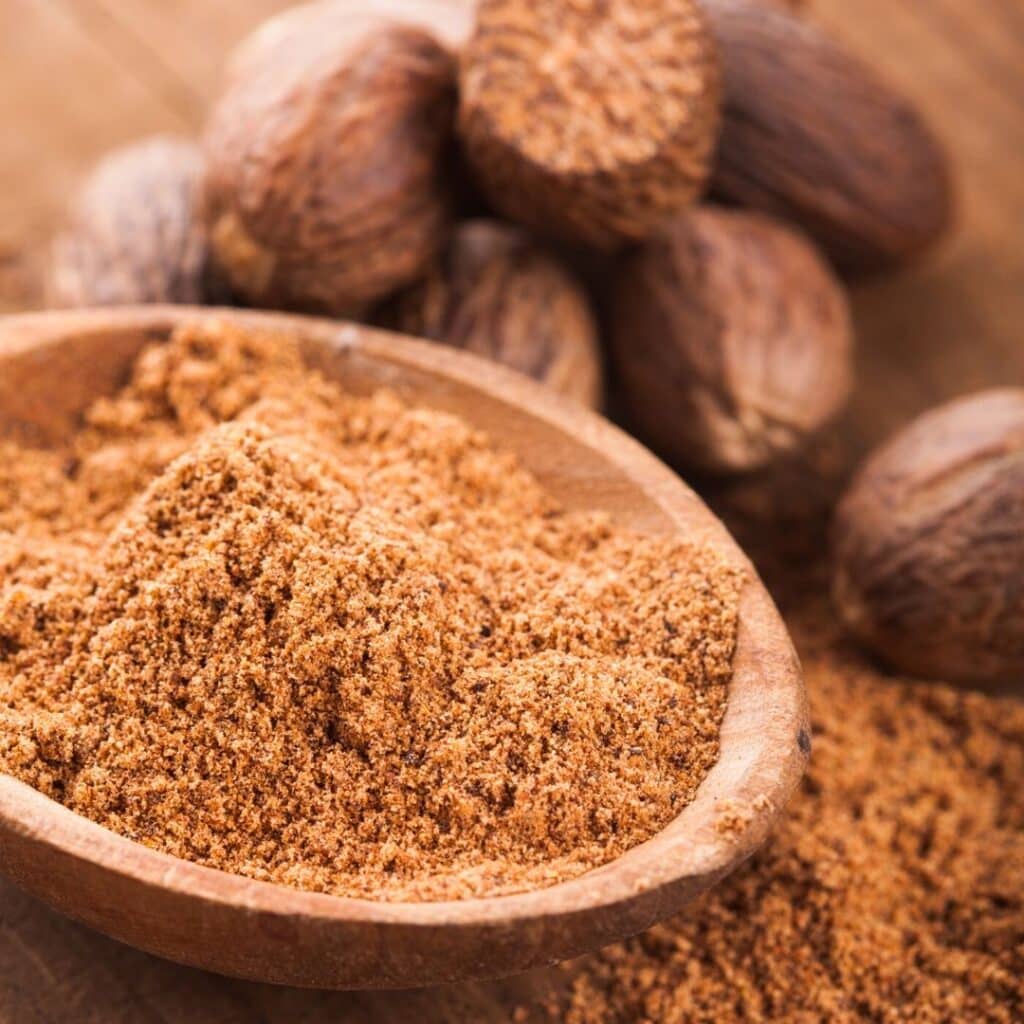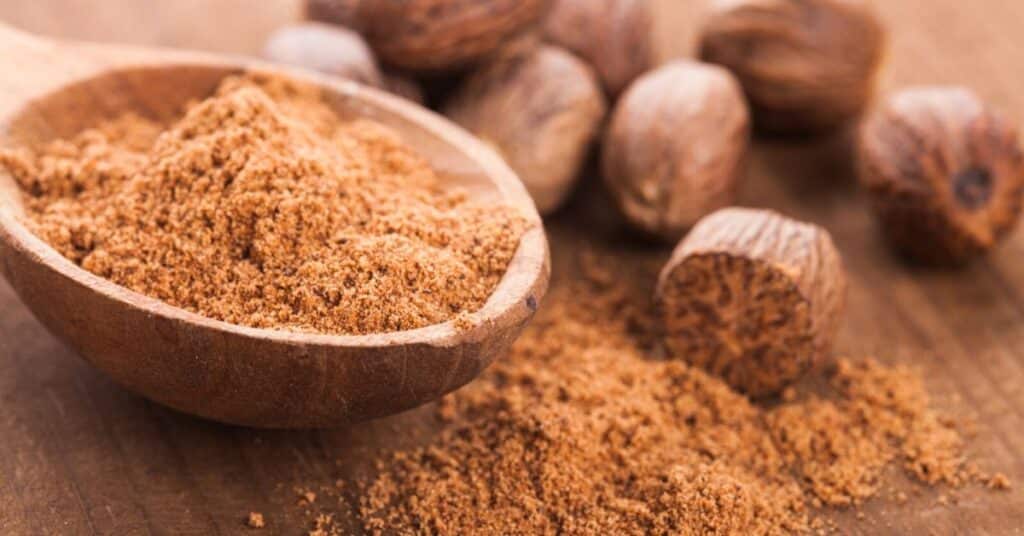Nutmeg is a delicious spice with a warm, sweet flavor that can be used in many of your favorite desserts and main dishes.
However, nutmeg has been known to cause psychoactive and hallucinogenic effects when taken in large doses. It’s not recommended for pregnant women or people who take certain medications.
If you don’t like the taste of nutmeg or if you just want to be on the safe side, then you can use the substitutes we’ve listed below.
This article discusses what nutmeg is, possible health benefits and side effects, and how to use it safely.
What is Nutmeg?
Nutmeg is a spice used in cooking. It is made from a seed that grows on an evergreen tree with dark leaves called Myristica fragrans. The tree is native to the Moluccas islands in Indonesia. It is cultivated in Indonesia and the West Indies (1).

Many people describe nutmeg as having a slightly spicy, warm, and sweet flavor. It can be used in many different dishes, including meat-based dishes, vegetarian dishes, desserts, and most notably, in eggnog recipes.
Nutrition Facts
A one-teaspoon serving of nutmeg contains the following (2):
- 11.6 calories
- 0.8 grams of fat
- 1.08 grams of carbs
- 0.46 grams of fiber
- 0.13 grams of protein
Vitamins and minerals:
- 4.05 mg of calcium
- 0.07 mg of iron
- 4.03 mg of magnesium
- 4.69 mg of phosphorus
- 7.7 mg of potassium
- 0.35 mg of sodium
- 0.05 mg of zinc
- 0.02 mg of copper
- 0.06 mg of manganese
- 0.03 mcg of selenium
- 0.06 mg of vitamin C
- 0.008 mg of thiamin
- 0.001 mg of riboflavin
- 0.03 mg of niacin
- 0.004 mg of vitamin B6
- 1.67 mcg of folate
- 0.19 mg of choline
- 2.24 IU of vitamin A
Health Benefits of Nutmeg
Nutmeg contains a wide variety of vitamins and minerals. When used in small amounts, such as a teaspoon, nutmeg can add delicious flavor to your food and deliver several health benefits.
We’ve listed some below.
It contains anti-inflammatory properties that may aid in heart health.
Research shows that nutmeg contains anti-inflammatory properties, such as gallic acid (3, 4).
Gallic acid is especially helpful in supporting heart health. Research shows that gallic acid has protective effects against cardiovascular complications due to its free radical scavenging abilities (5).
It contains analgesic and antithrombotic activities.
One study stated that nutmeg contains analgesic and antithrombotic. This means that it can bind to certain receptors in the body and producing pain-reducing, morphine-like effects (6).
Its antithrombotic activities can be used to reduce the formation of blood clots, which might be able to help reduce the risk of stroke.
It contains antimicrobial and antibacterial properties.
One study shows that nutmeg contains the following antimicrobial and antibacterial properties that can help protect against harmful organisms:
- B-pinene
- A-pinene
- Myristicin
- Isoeugenol
- P-cymene
- Carvacrol
- Eugenol
- β-caryophyllene
The study indicated that nutmeg held antimicrobial activity against all fungi and bacteria that was tested. Specifically, nutmeg had the most antimicrobial and antibacterial power against Staphylococcus aureus and Aspergillus niger (7).
It may contain anti-rheumatic properties.
Research shows that nutmeg contains anti-rheumatic properties that may help support rheumatoid arthritis (8). This is likely due to the anti-inflammatory and antioxidant activity of the spice.
It may help with digestive problems.
As a carminative, nutmeg may help prevent gastrointestinal gas (9). This can help reduce bloating and flatulence after meals.
It may act as an antidepressant.
One study found that nutmeg may possess antidepressant effects by interacting with the dopaminergic, adrenergic, and serotonergic systems (10).
However, another study found that nutmeg may act as a locomotor stimulant (11). If you have been diagnosed with depression, do not take nutmeg until you have been cleared by your doctor as these two actions may exacerbate one another.
It may help reduce blood sugar.
Nutmeg may help reduce blood sugar in people with diabetes (12). This is likely due to its anti-inflammatory and antioxidant properties.
It may help protect against cancer and chronic disorders.
According to a 2015 study, nutmeg may be effective against colon cancer because it appears to influence lipid metabolism, gut microbes, metabolic disorders, and inflammation (13).
Nutmeg Dosage, Side Effects, and Interactions
Research shows that nutmeg may contain a psychoactive agent called myristicin that causes hallucinogenic effects if you take too much of it. Other reports indicate that nutmeg was used to end unwanted pregnancies in the Middle Ages (14).
Mace is a spice similar to nutmeg. It comes from the same seed and contains the active ingredient myristicin, which is responsible for nutmeg’s possible psychoactive actions.
Research shows that low doses of 300 mg per day of mace is recommended with no serious side effects. However, ingesting 5 grams of nutmeg may cause psychosis, sedation, delusions, and even coma (15, 16, 17, 18, 19).
For this reason, we recommend that you only use a pinch of nutmeg when cooking. Consult your doctor before ingesting nutmeg if you are pregnant.
Nutmeg is reportedly safe to use when added to food as a flavoring agent in small amounts. However, higher doses may cause the following:
- Central nervous system excitation
- Fear
- Anxiety
- Flushing
- GI symptoms
- Decreased salivation
- Increased heart rate
- Psychosis
Nutmeg may also cause anticholinergic-like activity. Do not take nutmeg if you are currently on medications that treat dental problems, dry mouth, overheating, dementia, or blurred vision. Nutmeg may also interact with medications changed by the liver or CNS depressants/sedative medications.
Is Nutmeg Keto-Friendly?
Yes, nutmeg is a keto-friendly food as long as you consume a small amount, just like other cooking spices. Usually, you only need a pinch when cooking.
However, it’s important to remember that nutmeg and other spices are only meant to be used in small amounts as flavor enhancers.
We recommend only using a very tiny amount of nutmeg in your recipes. This will keep the carbs and calories down while also protecting you from the adverse effects of too much nutmeg.
Best Nutmeg Substitutes You Might Try
Nutmeg can be used in a wide variety of dishes. You can add it to main dishes or desserts.
Use your judgment when picking out the best nutmeg substitute for your dish. A sweet spice like cinnamon may work better in a pie while cumin does well in chili or soup.
Here are some keto-friendly nutmeg substitutes:
Pumpkin
You can use pumpkin extract or a tablespoon of pumpkin puree if you’re looking to add warm flavor and color to your dish in place of nutmeg. Keep your portions small if using pumpkin on keto to ensure you don’t consume too many carbs.
Ginger
Ginger has a calming, anti-inflammatory effect on the body. It’s especially useful for upset stomachs. Ginger can be used in both meat-based main dishes and sweet desserts.
Cardamom
Cardamom is another versatile herb that is similar to ginger. You can add it to hot drinks or use it in a spice blend to flavor meat.
Grains of paradise
Grains of paradise also belongs to the ginger family. It is described as having a pepper taste mixed with hints of citrus.
Peanut flour
If you’re short on spices, then try adding a teaspoon of peanut flour to your favorite dish in place of nutmeg. Peanuts have a mild flavor that go well in many dishes, just like nutmeg.
Citrus
Add a squeeze of fresh lemon or lime juice to any dish and you will instantly brighten the flavor. You can also use a citrus extract if you don’t have fresh fruit on hand.
Fenugreek
Fenugreek is another spice that has a seed-like appearance. Some people think that fenugreek smells and tastes like maple syrup.
Cumin
Like turmeric, cumin has incredible health benefits. It has a warm flavor with hints of lemon. Use it in Middle Eastern dishes, soups, marinades, and more.
Turmeric
Turmeric contains powerful antioxidant properties that is useful against oxidative and inflammatory conditions, arthritis, metabolic syndrome, anxiety, and hyperlipidemia (20). Use it as a marinade to flavor meat and vegetable dishes, or take it in supplement form.
Sesame oil
Sesame oil has a mild, warm and nutty flavor that you could use in savory dishes if you don’t have nutmeg on hand. Be sure to only use a small amount, such as a teaspoon, so that you don’t overpower other flavors in the dish or throw off its consistency.
Vanilla extract
Use vanilla extract in your sweet recipes or desserts and you won’t miss the nutmeg! Be sure to buy an extract that does not contain added sugars.
Almond extract
Almond extract has a nutty flavor that makes a great addition to keto desserts. Again, make sure any extract you buy does not contain added sugars.
Walnuts
Use ground or crushed walnuts if you want to replace the warm, nutty flavor of nutmeg in just about any dish. You can crumble some up and add to meat or use walnut extract in coffees and teas.
Chestnut
Use a bit of ground chestnut flour in your recipes in place of nutmeg. It can be hard to find, but it’s worth looking into if you want a flavorful nut flour to use in your baking that isn’t almond flour or coconut flour.
Keto Sweeteners
If you’re looking for a low-carb way to sweeten a dish, then consider a low-carb sweetener such as monk fruit, stevia, or erythritol. You can even combine your sweetener with one of the other savory herbs on this list.
Licorice
Licorice can be used in place of nutmeg if you are making something sweet, such as candy. It also has many benefits, such as antiviral and anti-microbial properties (21).
The following spices can be used as nutmeg substitutes. However, they also contain the active ingredient myristicin, which is the same ingredient in nutmeg that is linked to mental health issues when taken in large amounts (22, 23). Use these with caution.
Cinnamon
Cinnamon is one of the best substitutes for nutmeg in sweet dishes. It also contains numerous health benefits, such as anti-inflammatory, antioxidant, lipid-lowering, anti-diabetic, anti-cancer, and neuroprotective abilities (24).
Cloves
Cloves have a warm, spicy taste similar to nutmeg. They are best used in baked goods or as part of a marinade for meat. Cloves can also be added to hot chocolate or coffee.
Mace
Mace is made from the same seed as nutmeg. It has a flavor combination that is similar to pepper and cinnamon.
Caraway seeds
Caraway seeds have a different texture than nutmeg. Keep this in mind if you’re using it as a swap for nutmeg as it may change your recipe up. It’s best used in marinades and on meat.
Fennel
Fennel has an Earthy taste and a bit sweet. It goes well in marinades, soups, stews, and eggs.
Star Anise
Many people say that star anise tastes like licorice with sweet and subtle Earthy tones. This herb would taste great in a stir-fry.
For your curiosity, here are some nutmeg substitutes you can use if you’re not doing keto:
Brown sugar
Brown sugar is sweet and flavorful. Just like nutmeg, it can be used in soups, pies, marinades, and even as a glaze for meat.
Honey
Honey has a sweet, syrupy consistency that is stickier than nutmeg. But no one will complain if you add honey to your recipe and skip the nutmeg.
Molasses
Molasses has a bold, sweet flavor that goes great in marinades, cookies, candy, and stews. The consistency is thicker than honey. Remember that a little bit goes a long way.
Mashed banana
Mashed bananas can provide the sweet flavor you’re looking for in your dessert. If you’re using mashed banana in place of nutmeg, then try incorporating cinnamon or cloves with it.
Sweet potato
Sweet potato works well with cinnamon in baked goods, especially if you want to sneak in a serving of vegetables.
How To Use Nutmeg Replacements in Your Recipes
Here are some recipes you can use our nutmeg alternatives in:
- Delicious Keto Creamy Eggnog
- Chocolate Mason Jar Ice Cream
- Creamy Spinach Egg Casserole
- Mongolian Beef
- Chicken Teriyaki
- Peanut Butter Cookies
- Almond Coconut Flour Chocolate Chip Cookies
- Collagen Coffee Mousse
- Delicious Blackberry Custard Pie
Conclusion
Nutmeg is a delicious spice with a warm, spicy flavor. However, it has been shown to cause hallucinogenic effects if you take too much of it. It’s not recommended for pregnant women or people who take certain medications.
If you run out of nutmeg or simply don’t want to cook with it to be on the safe side, then you can use one of our many suggestions as a replacement. Cinnamon is our top choice for a similar sweet spice.
You can use a combination of savory herbs in meat-based dishes, such as cumin, fennel, star anise, and turmeric. You can also combine keto-approved sweeteners to replace nutmeg.
If you’re not keto, then get creative by using other sweet, flavorful ingredients in desserts, such as mashed bananas, sweet potatoes, and honey.
Photo credit: oksixx/depositphotos.com








